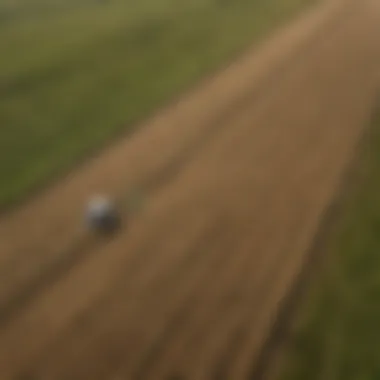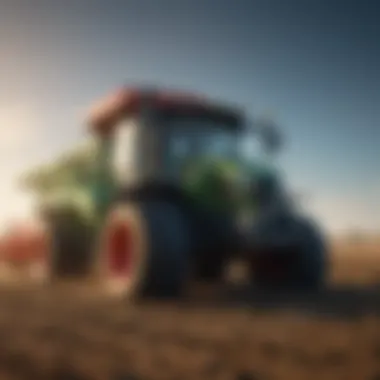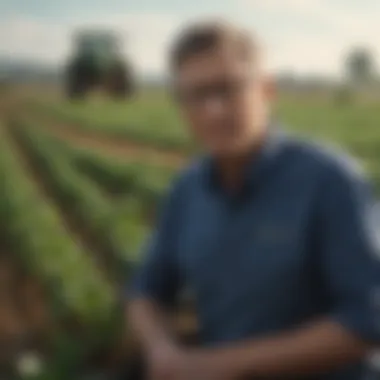Bill Gates' Farmland Investments: A Deeper Look


Intro
Bill Gates is a well-known figure in technology and philanthropy. Recently, he has also drawn attention for his significant investments in farmland. This shift from a focus on software to agriculture is not merely a financial strategy; it is rooted in a broader vision addressing critical global issues. The exploration of Gates' agricultural investments reveals his approach to innovation and sustainability in farming, as well as the potential risks and rewards associated with such endeavors.
Topic Overview
Definition and Importance
Investing in farmland refers to the acquisition of agricultural land for the purpose of cultivating crops, raising livestock, or other agricultural activities. This practice has gained significance due to growing concerns about food security, climate change, and sustainable practices. By leveraging investments in farmland, Gates aims to advance techniques that can meet the demands of a growing global population while ensuring environmental stewardship.
Brief History and Evolution
Historically, land ownership in agriculture has been associated with wealth and power. However, the modern era has introduced new complexities. Gates began his journey in farmland investment in the late 2000s. At that time, he recognized the potential of agricultural innovation in addressing pressing issues related to food production and environmental health. Over the years, his interest has evolved, integrating technology and research into the agricultural sector to create a transformative impact.
Key Techniques and Innovations
Sustainable Farming Practices
Sustainable farming encompasses strategies that promote environmentally friendly methods of agricultural production. Gates advocates practices such as crop rotation, organic farming, and reduced chemical usage. These methods not only lower the ecological footprint but also enhance soil health. This results in more productive land in the long run, providing a dual benefit to farmers and the environment.
Advanced Agronomic Technologies
The influence of technology on agriculture continues to expand. Gates supports innovations such as precision agriculture, which utilizes data analytics to optimize field-level management. Techniques like GPS-guided equipment and satellite imagery help farmers make informed decisions, leading to increased efficiency and reduced waste. This integration of technology is critical for meeting the demands of modern agriculture.
Practical Applications
Step-by-Step Guides
For those interested in adopting sustainable practices or integrating technology into their farms, a systematic approach is essential. Here is a basic outline of steps:
- Assess the current farming methods and identify areas for improvement.
- Research sustainable practices and choose applicable methods based on specific crops or livestock.
- Invest in technology as needed, such as irrigation systems or data management tools.
- Monitor results and adjust practices based on outcomes and feedback.
Case Studies or Real-World Examples
Analyzing specific instances of Gates' investments can provide insight into the effectiveness of these strategies. For example, the acquisition of land through the Cascade Investment LLC has focused on regions known for their agricultural potential. This investment not only finances current operations but also paves the way for future developments in the sector. Through these advancements, Gates demonstrates a commitment to addressing food security and promoting sustainable practices.
Foreword to Bill Gates' Agricultural Interests
The relationship between Bill Gates and the agricultural sector reflects a significant evolution in how influential figures engage with farming and land use. This section will elucidate the multifaceted interests that Gates holds in agriculture, revealing underlying motives and broader implications. Gates' involvement in farmland acquisition goes beyond profit. He aims to innovate farming practices, improve sustainability, and address food security challenges.
Background of Bill Gates
Bill Gates, co-founder of Microsoft, has long been recognized for his contributions to technology, business, and philanthropy. His transition from a tech entrepreneur to a prominent figure in agriculture may seem unexpected, but it is rooted in a consistent vision. Gates has always advocated for progress through innovation. Since departing from Microsoft's daily operations, he focused on challenges that affect global society, particularly health and education, and later, agriculture.
As his thought leadership evolved, Gates began to understand that sustainable agriculture plays a pivotal role in tackling world hunger, reducing poverty, and ensuring ecological balance. His wealth provided a platform to invest in solutions, particularly in the face of a growing global population and climate change issues.
Transition from Technology to Agriculture
Gates’ shift from technology to agriculture signifies a blending of sectors that might not seem naturally aligned. However, his application of technology in farming intends to revolutionize the way food is produced. The increasing success of precision agriculture tools and data analytics has opened possibilities for yields that were previously unattainable. Gates has emphasized the importance of using technology as a driver for improvements in farming.
This transition involves significant investment in research and development. Gates has funded various agricultural innovations, such as genetically modified organisms (GMOs) and sustainable farming techniques. These efforts mirror his previous challenges in the tech industry, where problem-solving and investing in future solutions were keys to success.
With farmland acquisitions, Gates is not just buying land; he is trying to set an example. His actions can illustrate to other investors the potential benefits of investing in agricultural sustainability. Gates sees these intersections as crucial to creating a more resilient food system globally.


Understanding Farmland Investments
Understanding farmland investments is crucial in the context of both economic stability and sustainable practices within the agricultural industry. Farmland has long been recognized as a valuable asset, primarily because of its necessity in food production. The ongoing global population growth amplifies this importance, making agricultural investments increasingly relevant. This exploration encompasses various dimensions—financial, environmental, and social—that shape how farmland is perceived and utilized today.
Trends in Agricultural Investment
Recent years have seen a notable shift in investment patterns in agriculture. A few distinct trends have emerged, reflecting both the changes in consumer preferences and advancing technology.
- Increased Interest from Non-Agricultural Investors: Many individuals and organizations outside traditional farming are investing in farmland. This influx often brings capital and innovative practices, potentially enhancing productivity.
- Emphasis on Sustainability: Investors are now more drawn to sustainable farming methods. They recognize that environmentally-friendly practices can lead to long-term profitability while minimizing ecological harm.
- Technological Integration: The use of technology in farming is on the rise. Precision agriculture, employing data analytics and automated tools, allows for more efficient resource usage and crop management.
- Changing Global Demand: As urban populations grow, demand for certain crops rises. This dynamic influences investment choices and areas of cultivation. Investors are keenly aware of market trends, tailoring their strategies to address consumer needs.
These trends not only clarify the agricultural investment landscape but also hint at broader economic shifts. Investors increasingly view farmland as not merely a piece of land but a strategic asset in their portfolios.
Bill Gates' Farmland Portfolio
Bill Gates' foray into farmland investment is notable, as it follows a meticulous strategy that reflects both personal and global concerns. His farmland holdings span multiple states in the United States, encompassing thousands of acres. These properties are often located in regions known for their agricultural productivity, such as Arkansas and North Dakota.
Gates’ portfolio evidentally includes the following characteristics:
- Diverse Crops: The focus is often on crops that are in high demand and sustainable. This diversification strategy helps mitigate risks associated with price volatility in different agricultural sectors.
- Partnerships with Effective Managers: Gates often collaborates with established agricultural management firms. Their expertise ensures that his investments utilize modern best practices tailored to local conditions, thus maximizing yield while adhering to sustainable principles.
- Long-term Vision: While many investors may focus on short-term gains, Gates appears to have a longer horizon. His investments seem aligned with the projected needs for food security globally, addressing both present and future demands.
In summary, Gates’ farmland portfolio illustrates a calculated approach. It combines financial acumen with a commitment to sustainable agriculture, ultimately aiming to influence the broader agricultural landscape.
Motivations Behind Gates' Farmland Acquisitions
Understanding the motivations that guide Bill Gates in his farmland investments sheds light on both economic and environmental considerations. These investments are not merely financial transactions; they signify a broader vision for the future of agriculture. Given the current challenges in the agricultural sector, Gates' acquisitions prompt a discussion on food security, sustainability, and the implications of land ownership in a modern context.
Economic Considerations
To grasp the economic motivations, it is vital to consider the rising demand for food due to population growth and dietary shifts. Investing in farmland is a strategic move. Farmland can be a resilient asset class, often showcasing stability during economic fluctuations. With agricultural commodities expected to see fluctuating prices, owning land provides a sense of security for long-term investments.
The diversification of investment portfolios is another key aspect. Farmland provides a hedge against risks found in other markets, such as stocks and bonds. Gates understands this well. By investing in land, he not only supports agricultural development but also positions himself to benefit financially over time.
Moreover, the financial returns from sustainable agricultural practices can be significant. Farming techniques that promote environmental health are increasingly recognized as profitable. Gates is likely motivated by this potential for lucrative returns while fostering positive change in the industry.
Environmental Sustainability Goals
Bill Gates’ approach to farmland investments extends beyond mere profit motives; it encompasses a deep commitment to environmental sustainability. These investments align with his broader vision of combating climate change through innovative agricultural practices.
Sustainable agriculture offers various benefits, including reduced carbon footprints and enhanced soil health. By investing in these areas, Gates aims to promote practices that contribute to increased crop yields while preserving natural resources.
Furthermore, Gates has voiced concerns about global food security and how climate change influences this. He believes that transitioning to sustainable practices is essential for ensuring food security for future generations. By acquiring farmland, he is strategically positioned to experiment with and promote farming methods that prioritize environmental stewardship.
"Investing in sustainable agriculture is not just about feeding the present; it's about securing the future of our planet."
In summary, the motivations behind Gates' farmland acquisitions combine economic rationale with a sincere commitment to fostering sustainable practices. These factors together illuminate the significance of agricultural investments in shaping a future where food production and environmental health are not at odds.
The Role of Technology in Agriculture
Technology plays a vital role in the agricultural sector, offering innovative solutions to age-old problems. With the constant demand for increased productivity and sustainability, the integration of technology has become essential. Agricultural investments, such as those made by Bill Gates, help to promote advancements that could revolutionize how food is produced. This section focuses on significant elements, benefits, and considerations regarding the role of technology in agriculture.
Innovative Farming Practices
Innovative farming practices have emerged as a response to the challenges faced by modern agriculture. Examples such as precision farming, vertical farming, and hydroponics have been gaining traction. Precision farming utilizes data analytics and GPS technology to optimize field-level management regarding crop farming. This method allows farmers to monitor crop health, soil conditions, and weather patterns more accurately.
Vertical farming, on the other hand, offers an alternative to traditional methods by growing crops in stacked layers, which makes it ideal for urban environments. Hydroponics involves growing plants without soil, using nutrient-rich solutions instead. These methods can reduce water usage, increase yield per area, and minimize the carbon footprint.


Tech-Savvy Farming: A New Paradigm
The concept of tech-savvy farming introduces a new paradigm where data and technology interlink closely with agriculture. Farmers are increasingly utilizing drones, sensors, and mobile applications to aid their farming practices. Drones can help survey large areas quickly, collecting valuable data on crop health and soil moisture. Sensors embedded within fields provide real-time feedback, enabling farmers to react swiftly to changing conditions.
Moreover, mobile applications facilitate the management of farms from anywhere, making it easier to track inventory, monitor crops, and communicate with suppliers. This tech-driven landscape leads to smarter resource management, helping farmers save on costs while improving crop yields.
Case Studies of Technological Integration
Numerous case studies showcase the successful integration of technology in agriculture. For instance, a project in India deployed mobile technology to help farmers optimize their irrigation practices. By providing real-time weather data via simple messaging services, farmers could make informed decisions about when to water their crops. This led to a significant reduction in water usage and a boost in productivity.
Another example comes from the United States, where major agribusiness firms have implemented big data analytics to improve crop selection and market strategies. By analyzing historical data and market trends, these firms are better equipped to advise farmers on the most profitable crops to plant.
"Technology is transforming agriculture, making it smarter, more efficient, and more sustainable."
In summary, the role of technology in agriculture is multi-dimensional, offering solutions that enhance productivity and sustainability. As Bill Gates continues to invest in agricultural ventures, the expectation is that these innovations will further bridge the gap between technology and food security, connecting farmers with tools necessary for success.
Impacts on Food Security
The topic of food security is crucial in the discussion surrounding Bill Gates' agricultural investments. Throughout history, agriculture has played a foundational role in ensuring that populations have access to enough nutritious food. With an increasing global population and shifting climate patterns, the task of securing food has become more complex. Gates' foray into farmland acquisition reflects a strategic response to these pressing challenges. His investments are often seen not just as personal ventures, but also as an integral part of a larger vision for sustainable global food systems.
Understanding Global Food Challenges
Global food security faces several multifaceted challenges. First, population growth poses a significant issue. The United Nations predicts that by 2050, the world’s population could reach nearly 10 billion people. With this rise, food demand will increase sharply. Currently, many countries struggle to produce enough food to feed their populations. Notably, in developing nations, food scarcity is a pressing concern, often exacerbated by poverty and inadequate infrastructure.
Environmental factors also compound the problem. Changes in climate result in unpredictable weather patterns, affecting crop yields. Issues like drought, flooding, and changing soil properties threaten traditional farming methods. As a result, more innovative solutions need to be implemented to cope with these changes.
Additionally, political instability in certain regions can disrupt food distribution and access. Countries facing conflict often experience severe food shortages because of damaged transport networks and disrupted agricultural activities.
Understanding these challenges allows for a clearer view of why agricultural investment is necessary. Bill Gates recognizes that addressing food security effectively requires both financial investment and innovative approaches to farming practices.
Gates' Vision for Food Production
Bill Gates' vision for food production extends beyond mere investment. It encompasses a holistic approach to improving agricultural resilience and sustainability. The goal is to ensure that all people, especially in vulnerable regions, have adequate access to food.
His efforts focus on the following key areas:
- Investment in technology: Gates advocates for precision agriculture, which uses data and information technologies to optimize farming practices. This ensures that more efficient use of resources, such as water and fertilizers, can be achieved.
- Research and development: Collaborations with agricultural research entities, such as the Bill and Melinda Gates Foundation, aim to develop crops that can withstand climate variability. For instance, drought-resistant crops hold significant promise for increasing yields in arid regions.
- Support for local farmers: By investing in local farming initiatives, Gates envisions empowering communities. This includes training farmers in sustainable practices, access to better seeds, and financial support to enhance productivity.
In summary, Gates' vision is to create a food system that is not only efficient but also equitable. His approach signifies a collaborative effort, aiming to innovate and apply practical solutions that bolster food security on a global scale.
"Food security is not just about food availability, but also about accessibility and sustainable practices that communities can depend on."
The implications of Gates' work in agriculture could serve to mitigate some of the most pressing food security challenges facing our world today, establishing a solid foundation for future generations.
The Controversy Surrounding Large Land Acquisitions
The acquisition of large tracts of land, particularly by influential figures like Bill Gates, invites both scrutiny and debate. This controversy is significant as it encompasses various themes that affect local communities, global markets, and environmental sustainability. Understanding these elements gives insight into the motivations behind such investments and their potential effects on agriculture and society as a whole.
Public Perception of Gates' Investments
Bill Gates' investment in farmland has generated mixed reactions from the public. On one hand, some view these acquisitions as beneficial. Supporters argue that Gates' wealth allows for potential innovation in sustainable farming practices. They believe that his influence could lead to advancements in food production technology, which may help address global food shortages.
On the other hand, a substantial segment of the public expresses concern about the implications of his land ownership. Critics argue that large-scale land acquisitions often favor corporate interests over those of traditional farmers. Many see Gates as exemplifying a trend where wealthy individuals exert control over critical resources, potentially leading to a monopoly on farming practices. This perception raises alarms regarding local food systems, community autonomy, and land rights.


Social media platforms, like Reddit and Facebook, act as venues for discussion on this topic, where various perspectives can be shared. Such platforms highlight how public sentiment can quickly oscillate from admiration to criticism, especially in the face of economic disparity and food insecurity.
Ethical Implications of Land Ownership
The ethical considerations surrounding land ownership by figures like Gates are complex. One major concern is the principle of land as a community resource versus a commodity. Large acquisitions often lead to questions about who truly benefits from agricultural production. While Gates may champion sustainability, there are worries about the potential displacement of smallholder farmers and the erosion of traditional land use practices.
Furthermore, Gates' ownership can be viewed through the lens of power dynamics. Large landholders tend to have a considerable influence on agricultural policy. This raises ethical questions regarding accountability. If agricultural land becomes overly consolidated in the hands of a few, it can limit diversity in farming practices and undermine food sovereignty.
Moreover, critics argue that Gates' investments might perpetuate a system where profit motives overshadow the needs of marginalized communities. The focus on maximizing returns can conflict with ethical farming practices and local agricultural traditions. The community’s voice often gets sidelined in favor of corporate objectives, leading to a significant ethical dilemma that needs addressing.
"The crux of the controversy lies in balancing investments aimed at improving agricultural outputs with the need to respect local communities and promote equitable practices in land ownership."
In summary, the debate regarding the public perception and ethical implications of Bill Gates' large-scale farmland investments serves as a crucial discourse that reflects broader societal concerns over land, power, and sustainability. As these discussions continue, they emphasize the need for transparency and community engagement in agricultural investments.
Future Prospects of Bill Gates' Agricultural Ventures
The future of Bill Gates' ventures in agriculture holds significant interest for multiple stakeholders. Not only do these investments represent a shift in focus from traditional technology sectors, but they also indicate a deep commitment to addressing some of the world’s pressing agricultural challenges. As Gates continues to acquire farmland, his strategic approach may reshape agricultural landscapes, thus altering the dynamics of food production globally.
Potential for Influence on Policy
Gates' investments in agriculture come at a time when the world faces critical challenges in food security and sustainability. With his position as a leading investor, Gates has the potential to influence agricultural policies worldwide. His approach prioritizes innovative practices aimed at optimizing land use and crop yields.
The agricultural policies that emerge from Gates' influence could address various issues, such as:
- Climate Change Mitigation: Advocating for policies that support sustainable farming practices could help combat climate change.
- Technology Adoption: Encouraging the integration of advanced technologies into farming could boost productivity and resource efficiency.
- Food Security Initiatives: Supporting regulations that ensure equitable access to food resources for populations in need.
Gates understands that policy plays a crucial role in enhancing the agricultural sector. Collaborating with governments and organizations might lead to transformative changes that promote sustainable agriculture. His ability to leverage his wealth and connections can mobilize resources necessary for significant policy shifts.
Sustainability as a Continuing Focus
Sustainability is likely to remain at the core of Gates’ agricultural initiatives. His past ventures reflect a commitment toward land stewardship and development of effective farming techniques that minimize environmental impact.
This ongoing focus on sustainability can manifest in various ways:
- Water Conservation: Implementation of practices that enhance water efficiency will be key in regions prone to drought.
- Soil Health: Initiatives that improve soil fertility and reduce dependency on harmful pesticides.
- Biodiversity: Conservation efforts that support diverse ecosystems and promote resilient agricultural systems.
Investing in sustainable practices not only aims to secure long-term agricultural success but also aligns with global sustainability goals. Gates' endeavors could inspire other investors and stakeholders to prioritize environmentally-friendly farming.
Closing Thoughts
The examination of Bill Gates’ agricultural investments provides significant insights into the evolving landscape of modern agriculture. This closing section will synthesize key insights from previous sections and reflect on the future implications of these investments.
Summary of Key Insights
In this exploration, several critical aspects have been emphasized:
- Gates’ Economic Motivations: Bill Gates has strategically purchased farmland with the aim of diversifying his investment portfolio. The decision reflects a broader trend of affluent individuals moving towards tangible assets like agricultural land.
- Sustainability and Innovation: Gates’ focus on sustainable agriculture highlights the urgent need for environmentally responsible farming practices. His investment is not only financial but also influenced by a desire to promote innovations in farming through technology.
- Global Food Security: The challenges in food security are a recurring theme. Gates’ vision aims to address these challenges by using his investments to influence policy initiatives and technological advancements in food production.
"Investing in agriculture is investing in the future of global health and sustainability."
- Public Perception and Ethical Considerations: The discussion around Gates' land acquisitions raises questions about the ethics of large-scale land ownership. Public sentiment varies, indicating a divide between viewing these investments as beneficial or detrimental to local communities.
Understanding these insights provides a framework for analyzing not just Gates’ approach but the broader implications for the agricultural sector as a whole.
Final Reflections on the Future of Agriculture
Looking forward, several potential trajectories emerge from Gates' influence in agriculture:
- Policy Influence: Gates’ investments could significantly shape agricultural policies aimed at sustainability. His philanthropic efforts and strategic partnerships may lead to favorable regulations that promote innovative farming practices.
- Technological Implementation: The integration of technology in farming is likely to accelerate, with Gates at the forefront. Innovations such as precision agriculture, data analytics, and genetically modified organisms can reshape food production processes.
- Environmental Stewardship: As society becomes more aware of climate change, there is a growing demand for sustainable practices. Gates' commitment to environmental stewardship through his agricultural initiatives could lead to industry-wide changes in how farming is conducted.
In summary, the multi-dimensional relationship between Bill Gates and farmland signifies a pivotal shift in agricultural investment strategies. The implications of his actions extend beyond personal gains and raise important discussions about the future of global agriculture, food security, and sustainability in the coming decades.



